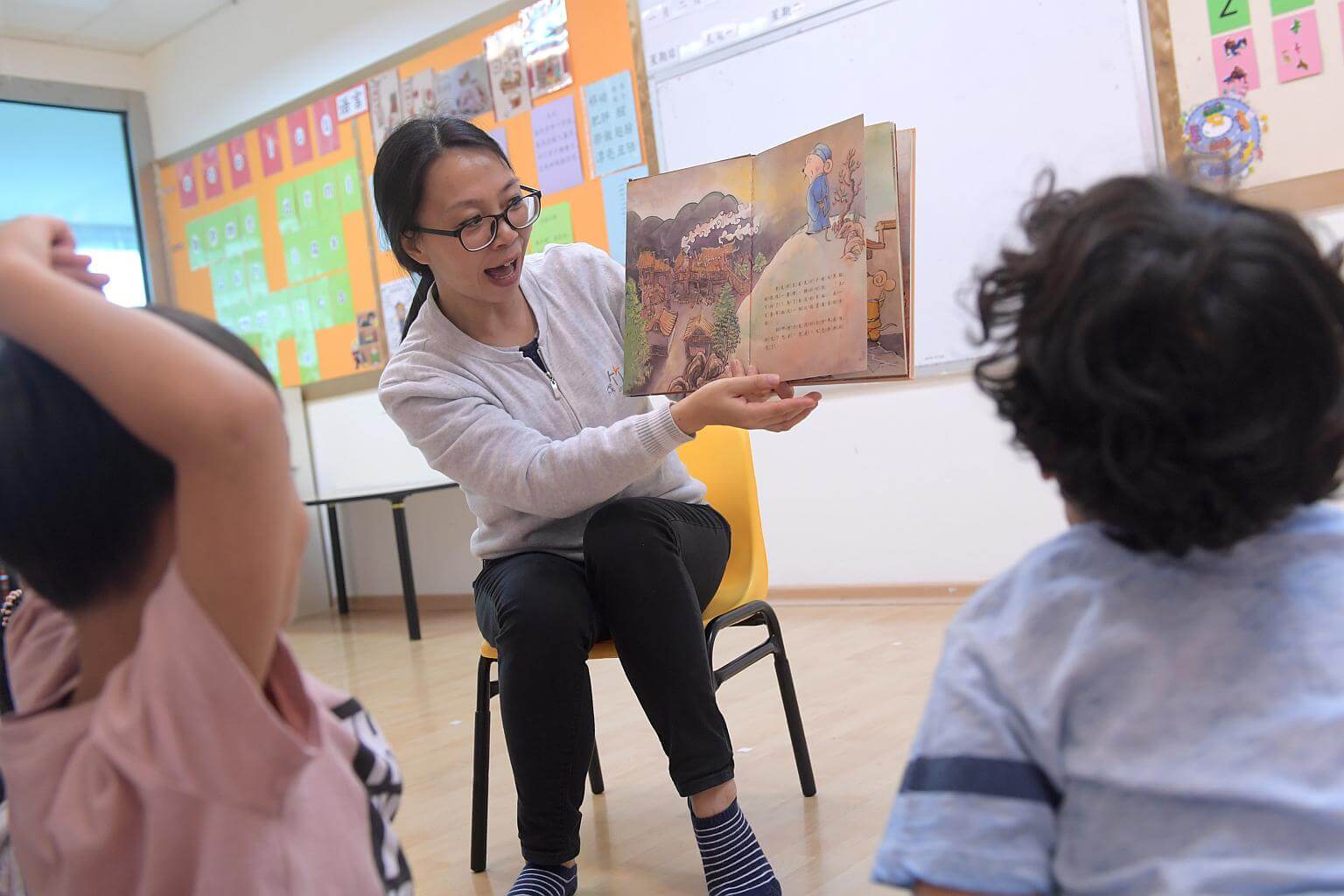Pre-schools struggle in hiring local mother tongue teachers
Sign up now: Get tips on how to help your child succeed

Across the sector, there are about 5,700 early childhood educators who specialise in teaching mother tongue language, of whom 3,300 are locals.
ST PHOTO: JAMIE KOH
Follow topic:
SINGAPORE - Hiring locals to teach mother tongue languages in pre-schools remains a challenge, even as parents show more interest in wanting their children to be bilingual.
Locals currently make up six in 10 of mother tongue language teachers in pre-schools, according to Early Childhood Development Agency (ECDA) figures.
Across the sector, there are about 5,700 early childhood educators who specialise in teaching mother tongue language, of whom 3,300 are locals.
Anecdotally, pre-school operators said it is not easy to recruit Singaporeans to specialise in mother tongue language teaching.
Dr T. Chandroo, chief executive of pre-school chain Modern Montessori International, said most younger people speak English and would not opt for Mandarin early childhood courses. Some 75 per cent of its 20 mother tongue language teachers are foreigners.
Similarly, 80 per cent of EtonHouse's Chinese language teachers are from China, while the rest are locals.
Ms Thian Ai Ling, deputy general manager of My First Skool, said the base pool of graduates in Singapore who are qualified to teach Chinese is "not big to begin with". They also have other job options like joining Ministry of Education schools, she added.
Mr Ng Yi Xian, executive director of EtonHouse International Education Group, said it is always looking out for quality Mandarin teachers who can help children appreciate different cultures.
"As this talent pool can be quite limited in Singapore, we therefore have to recruit from overseas," he said, adding that it taps on EtonHouse's schools in more than 20 Chinese cities in its hiring process.
Similarly, a spokesman for PAP Community Foundation Sparkletots said it has recruited foreign teachers since 2010 to meet the growing need.
Ang Mo Kio GRC MP Ang Hin Kee, executive secretary of the Education Services Union which represents pre-school teachers, said the Government is ramping up the number of pre-school educators, including those teaching mother tongue langauges. For instance, since 2016, students who wish to become mother tongue preschool teachers can pursue specialised tracks at the polytechnics.
"There is a local pipeline coming in, but it will take a couple of years before these new teachers start teaching," he said.
Dr Intan Azura Mokhtar, an MP for Ang Mo Kio GRC, voiced concern in Parliament last November that a sizeable proportion of foreign mother tongue language teachers in pre-schools could affect young children's learning of the languages.
This is because foreign teachers could have limited understanding of local culture and context, or speak in different accents.
But pre-school operators said that many have settled in Singapore with their families and become familiar with life here.
Some even obtain permanent resident status, said Ms Thian Ai Ling, deputy general manager of My First Skool, which trains teachers when they arrive.
Being native speakers of Mandarin, they are also fluent in Chinese culture and traditions - from making dumplings and spring rolls to calligraphy.
Ms Fiona Walker, chief executive of Julia Gabriel Education which has 49 Chinese teachers all from abroad, said: "For many Singaporeans their first language is English, so their competency in Mandarin may not be at the same level as a native speaker.
"In pre-school, especially, where so much of the engagement involves singing and nursery rhymes, it can be quite hard for locals as it's not just teaching a language formally."
Her group runs five Chiltern House pre-schools and Chengzhu Mandarin Centre, which has a kindergarten as well as Mandarin enrichment programmes. Its Chinese teachers have each served for an average of five years, with the longest at 22 years.
Mrs Tammy Calabro approves of her six-year-old daughter being taught Chinese by native speakers.
"I don't think it's a problem. In fact, their Chinese is so much more poetic and flowery, and it's good to let the kids listen to them," said the restaurant owner in her 30s.
"The teachers are educated and not just good in Chinese language, they also know how to deal with kids."

